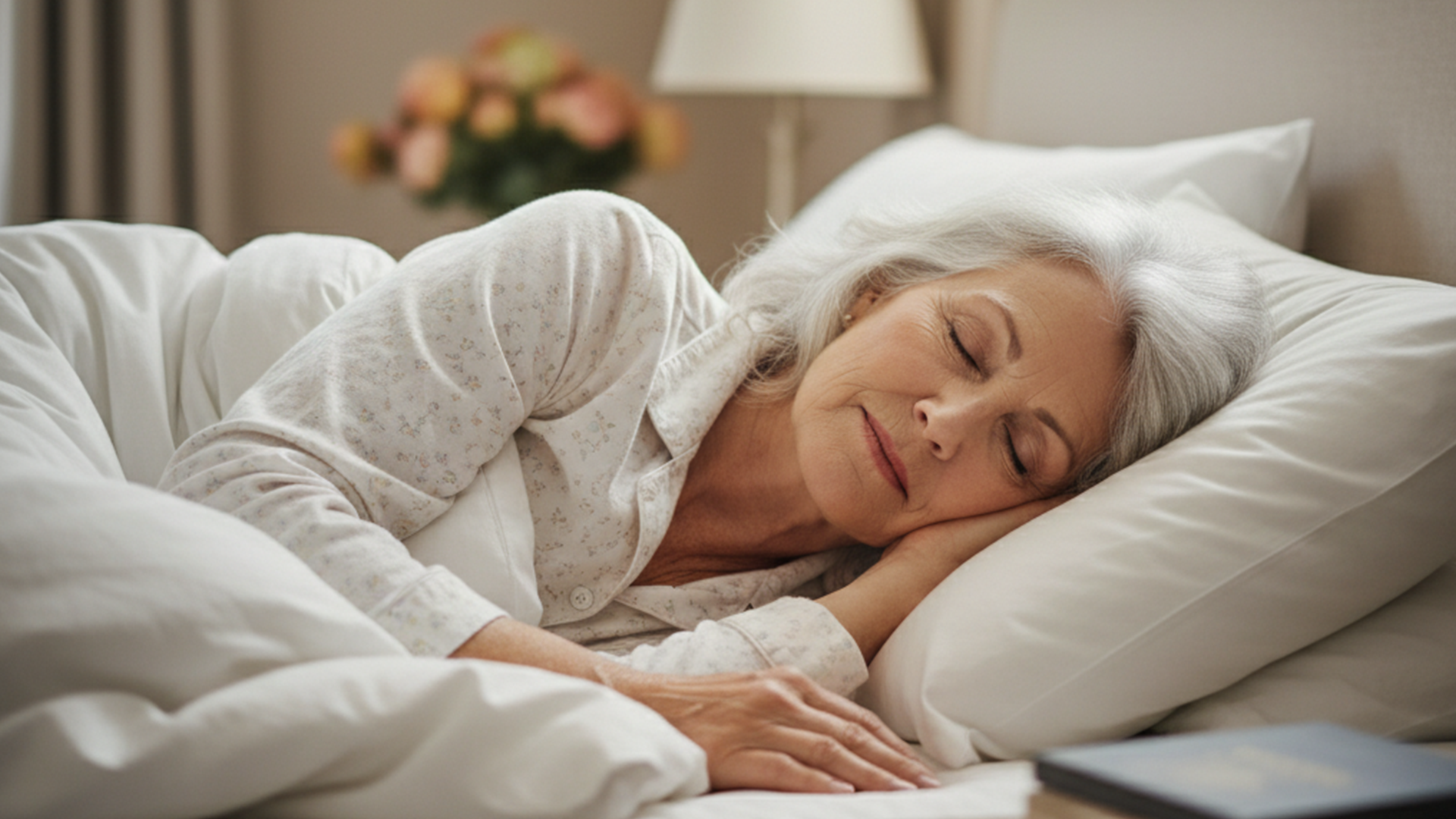Informazioni sul Sonno e i Nostri Anziani
Con l'avanzare dell'età, il sonno spesso diventa una danza più delicata. Per molti anziani, il sonno profondo e ininterrotto della giovinezza lascia il posto a un riposo più leggero e frammentato. Possono trovare più difficile addormentarsi, svegliarsi più spesso durante la notte o alzarsi prima del previsto al mattino. Questo accade perché l'orologio interno del corpo, che regola il sonno e la veglia, cambia con l'età, spingendo spesso gli anziani verso orari di andare a letto e di svegliarsi più precoci. Inoltre, il cervello produce meno melatonina, l'ormone che segnala che è ora di dormire, rendendo più difficile prendere sonno. Cambiamenti fisici, come dolori o condizioni mediche, e persino i farmaci, possono ulteriormente disturbare il ritmo del riposo. Tuttavia, il sonno rimane vitale per gli anziani, supportando la memoria, l'umore e la salute generale. Sebbene gli anziani possano aver bisogno di un sonno leggermente inferiore rispetto ai più giovani—tipicamente sette-otto ore—la qualità conta più della quantità. Creare una routine serena prima di dormire, limitare il tempo davanti agli schermi e mantenere un orario costante può aiutare a rendere quelle ore notturne più rigeneranti.
NeuroVIZR: Una Soluzione Naturale per un Sonno Migliore negli Anziani
Con l'età, ottenere un sonno riposante può diventare una sfida, con un riposo più leggero e frammentato che spesso sostituisce il sonno profondo della giovinezza. Per gli anziani che cercano il miglior aiuto per dormire bene, NeuroVIZR offre un approccio innovativo e non invasivo su come ottenere un sonno migliore. Utilizzando stimolazioni luminose e sonore, questo dispositivo guida delicatamente il cervello in uno stato rilassato e pronto per il sonno, rispondendo a domande comuni come come dormire meglio e come migliorare il sonno profondo.
perché il sonno diventa più difficile con l'età
L'invecchiamento modifica il ritmo circadiano del corpo, portando spesso a orari di andare a letto e svegliarsi più precoci. La ridotta produzione di melatonina rende più difficile addormentarsi, mentre fastidi fisici o farmaci possono interrompere la continuità del sonno. Tuttavia, un sonno di qualità, in particolare il sonno profondo a onde delta, rimane vitale per la memoria, l'umore e la salute. NeuroVIZR affronta queste sfide direttamente, offrendo un percorso naturale su come ottenere un buon sonno senza i rischi degli aiuti tradizionali per il sonno.
Come NeuroVIZR Aiuta a migliorare il sonno profondo?
Promuove il Rilassamento: Le sessioni serali utilizzano luce e suono per calmare i modelli neurali iperattivi, riducendo stress e rumore mentale che impediscono agli anziani di addormentarsi. Questo risponde a come dormire bene creando un ambiente sereno prima del sonno.
Potenzia il Sonno Profondo: Stimolando l'attività delle onde cerebrali delta, NeuroVIZR supporta le fasi di sonno più profonde essenziali per la riparazione fisica e la consolidazione della memoria, affrontando direttamente come migliorare il sonno profondo.
Supporta la Coerenza: L'uso regolare allena il cervello ad associare le sessioni di NeuroVIZR al riposo, aiutando gli utenti a dormire di più addormentandosi più velocemente e rimanendo addormentati più a lungo.
Non Invasivo e Sicuro: A differenza delle pillole, NeuroVIZR evita effetti collaterali, rendendolo ideale per gli anziani che si chiedono come posso dormire meglio senza farmaci.
Consigli Pratici per Usare NeuroVIZR
- Per massimizzare i benefici di NeuroVIZR per un sonno migliore: Sessioni Mattutine per l'Allineamento Circadiano: Inizia la giornata con una sessione mattutina di NeuroVIZR di 15–20 minuti progettata per energizzare e allineare il ritmo circadiano. Queste sessioni utilizzano modelli di luce e suono stimolanti per segnalare la veglia, aiutando a stabilire un tono positivo per il ciclo sonno-veglia e rafforzando come dormire meglio stabilendo un ritmo costante.
- Rilascio dello Stress a Mezzogiorno: Usa una sessione di NeuroVIZR di 10–15 minuti a mezzogiorno per liberare lo stress accumulato. Queste sessioni mirano agli stati delle onde cerebrali alfa e theta per promuovere il rilassamento senza sonnolenza, allenando il cervello a gestire lo stress e a prevenire che interferisca con il riposo notturno. Questo supporta come ottenere un buon sonno riducendo la tensione diurna che può persistere fino alla sera.
- Routine Serale Pre-Sonno: Usa le sessioni serali 30–60 minuti prima di andare a letto in una stanza tranquilla e poco illuminata per prepararti al riposo. Queste sessioni promuovono l'attività delle onde delta per un sonno più profondo, affrontando come migliorare il sonno profondo.
- Abitudini Complementari: Abbina NeuroVIZR a una routine serale coerente, come leggere o fare stretching leggero, e evita la luce blu degli schermi almeno un'ora prima di dormire per aumentare la produzione di melatonina e supportare come dormire bene.
Perché NeuroVIZR è il Miglior Aiuto per il Sonno?
Con oltre 100 sessioni di luce e suono, incluse alcune ottimizzate a 40 Hz, NeuroVIZR allinea il cervello al suo naturale ritmo circadiano, offrendo una soluzione personalizzata su come ottenere un buon sonno. La sua portabilità e facilità d'uso lo rendono accessibile agli anziani, sia a casa che in viaggio. Favorendo un sonno più profondo e rigenerante, NeuroVIZR permette agli utenti anziani di svegliarsi riposati, rispondendo alla richiesta di un sonno migliore in modo naturale ed efficace.



Routine Mattutine con Neurotecnologia per Aumentare la Concentrazione nello Studio
11 Dispositivi Indossabili per il Benessere e Dispositivi Cerebrali da Provare nel 2025